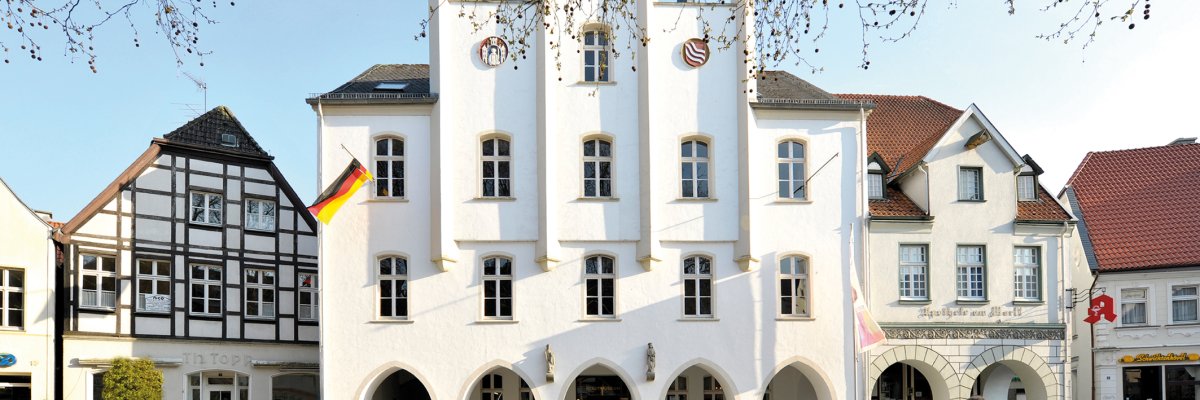Small house with big aspirations
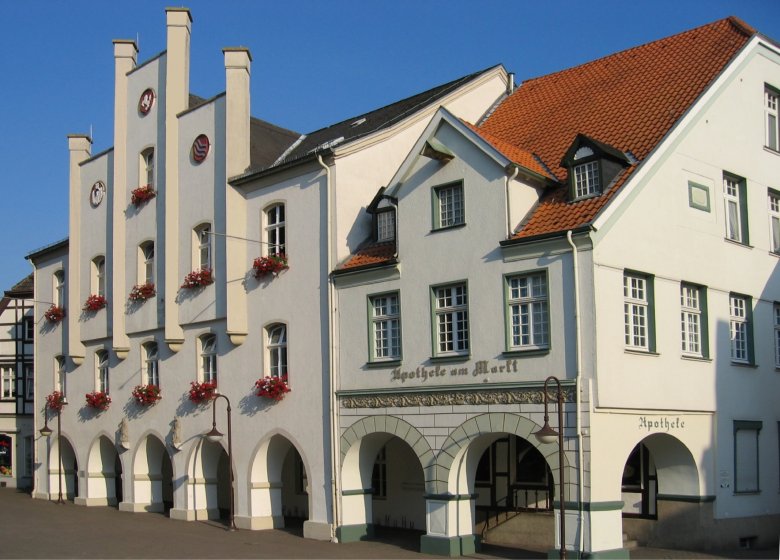
Current exhibition:

Achim Zeman:
Spatial illusions - illusionary spaces
24.01.2025 - 27.04.2025
Experience the familiar rooms of the museum in a different way: with unusual perspectives, astonishing views, a little "crazy", definitely enchanted.
What underlies Zeman's work is undoubtedly his almost obsessive interest in space and movement, and his endeavour to turn these dynamic spatial experiences and spatial sensations into images. This is an exploration of reality in the unity of thought, feeling and action.
With his temporary optical lineaments and shapes, Achim Zeman brings the old walls back to life!
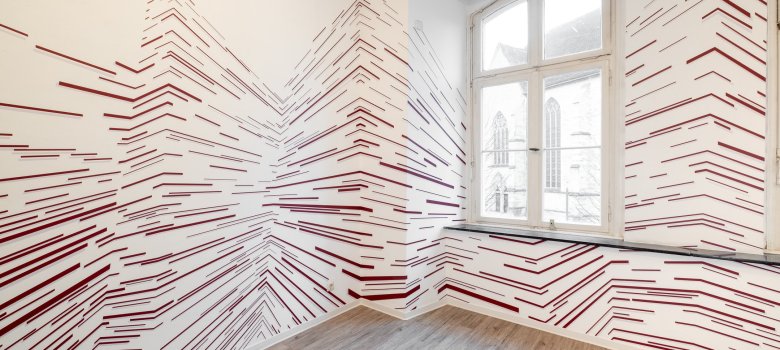
Next exhibition:
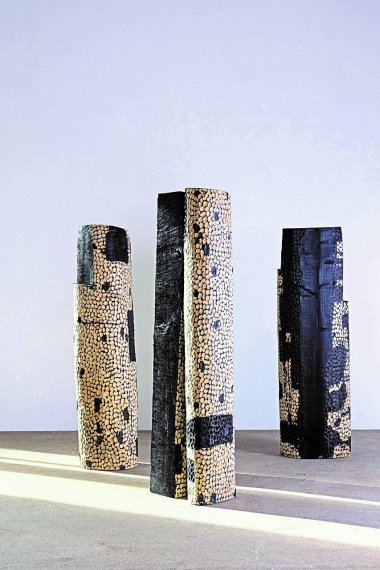
Werner Schlegel:
Sculpture and image
11.05.2025 - 20.07.2025
Werner Schlegel's oeuvre is diverse and multifaceted. In addition to classical sculpture, it also includes painting and graphic art. His favourite materials are wood and black ink on canvas or paper. The individual areas of work appear in his oeuvre both in their pure form and in fruitful mutual interpenetration and enrichment. He often combines them in a multifaceted and exciting way.
The sensitive placement of his individual works in exhibition spaces often has the character of a grand staging with both strong and soft tones. His works are characterised by artistic empathy and determination in equal measure. They are characterised by an archaic yet timeless power.
Four to six times a year, the Beckumer Stadtmuseum museum shows special exhibitions of contemporary modern art that are well worth seeing.
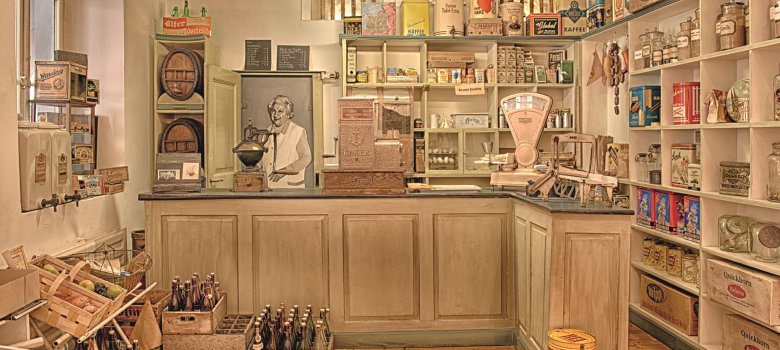
The true-to-the-original corner shop or the old living room/kitchen elicit a "Remember?" from many a museum guest. With the furnishing of the carnival room, the museum has succeeded in presenting 500 years of carnival tradition in a very small space.
Current dates
Information on the permanent exhibition
The City Museum is always in season
Visitors to the museum receive a welcome in the corner shop, which has been faithfully reconstructed in the museum. It dates back to 1908 and was operated in Beckum until 1993.
Living room of a cement director next to an old school class
On the ground floor, the living room (around 1910) of a local cement plant director, whose family portraits are by the Beckum painter Joseph Seiwert, presents itself in a grand bourgeois manner. Another room houses an old school class of the kind that often existed in the farming communities around Beckum.Exhibits on the early history of settlement
The museum's collections represent the development of Beckum's urban history from the 13th to the 19th century. Stone Age finds and documentation on the history of Frankish settlement (the so-called princely tomb of Beckum around 600 AD) illustrate the early history of the Beckum area.Hanseatic town and cement district
The important role of the Hanseatic town of Beckum in the Middle Ages is illustrated by various legal documents and by the guild system based here. Another focus is the presentation of the local industrial history, which is mainly characterised by the production of lime and cement. This is followed by the geological-palaeontological finds; in addition to Cretaceous fossils, there is also documentation on the former strontianite mining.Jewish community
A brief outline is dedicated to the town's former Jewish community , whose community school is documented in a chronicle. The permanent exhibition is rounded off with folklore documents on the tradition of marksmen, the local pewter masters and sacred collections from the 16th to the late 19th century. The film documents in the multimedia carnival room, which document the carnival activities from 1913 and throughout the Nazi era, as well as the accompanying historical circumstances, are unique.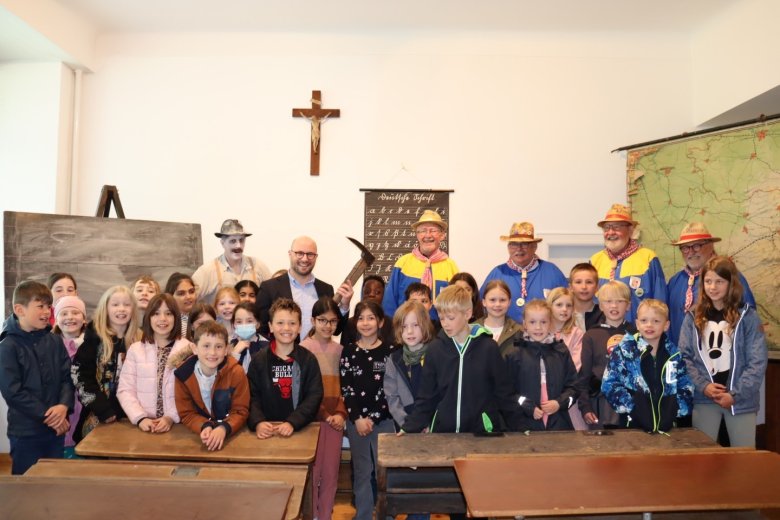 Educational programmes for the youngest museum visitors take place in the historical classroom.
Educational programmes for the youngest museum visitors take place in the historical classroom.Time travel through 500 years of carnival history
Carnival activities have a long tradition in Beckum. Starting with the oldest evidence of the "Heischegänge" of the Bauknechtsbruderschaft in 1467, it continues with the so-called "Beckumer Anschlägen" (Beckum attacks) as a Westphalian "Schildbürgerstadt" (town of shield citizens) up to a carnivalistic character according to the Rhineland model with the proclamation of the first town prince in 1893. From the diverse roots, the largest town festival has finally developed and the carnival is one of the most important image carriers of the town. The start on 11.11 at 11:11 a.m. marks the beginning of a densely packed foolish session that culminates on Rosenmontag and Klingeldienstag. However, only a few people are aware of the historical roots that go back more than half a millennium, which is why the Beckum Town Museum has now dedicated a separate, modern room to this facet of the town's history.
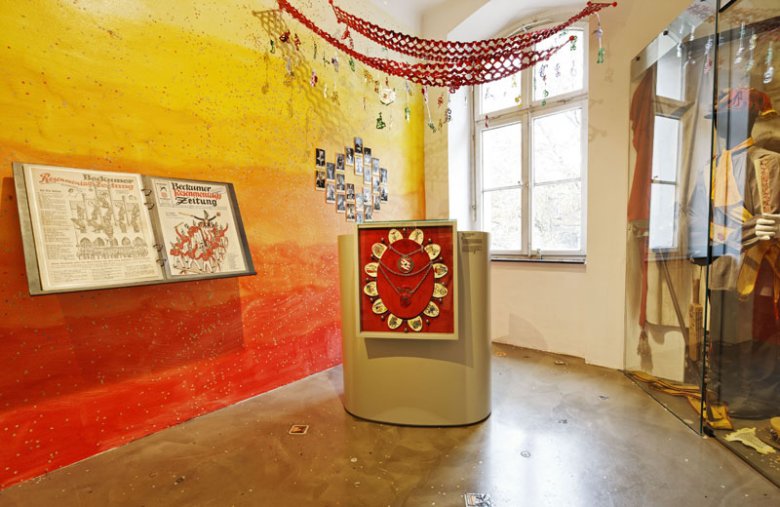 Image source: Anne Roerkohl
Image source: Anne RoerkohlThe problem to be solved here was to present the exuberant carnival hustle and bustle, the joyous joie de vivre, everyday jokes and satire in a museum setting that was credible and contemporary-attractive for young and old alike, while at the same time providing the required historical enlightenment about the phenomenon of carnival. The solution, which was developed in the City Museum, consists of an interactive, computer-supported carnival booth, on which the museum visitor can click down into the multi-layered, carnival past.
The chain with which the Beckum town prince is proclaimed every year serves as the starting point here. Its various medallions show shield pranks and carnival features. By clicking on a medallion, the "wheel of fortune" turns to the desired theme, which is presented by means of spoken Low German texts or sung songs, before historical explanations follow on another level. The famous "flip side" of each medal is also presented, with the jester's bell sounding each time.
Numerous carnival medals, the oldest issues of the own carnival newspaper "Beroz" (Beckumer Rosenmontags-Zeitung) since 1894 round off the collections. Of particular interest are the carnival films from the 1930s onwards, some of which are presented with original sound on three monitors. A special highlight is a Rosenmontags film from 1913, which is also the oldest surviving film document from all of Westphalia.
The Beckum prince was not alone - his followers and their most beautiful valuables
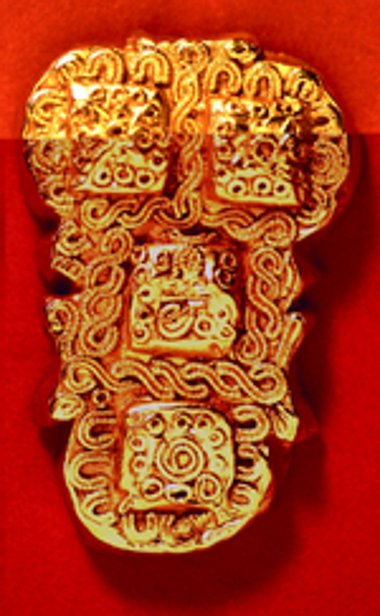
The so-called princely tomb of Beckum, discovered in 1959, is well known among experts and in wide circles of the population. Regular lectures are held on the occasion of excavation anniversaries and the latest archaeological findings are presented. Less well known, however, is the neighbouring burial ground on today's Germanenstraße, which was discovered as early as 1860, exactly 150 years ago, and was uncovered by the excavators Baurat Franz Arnold Borggreve and Hofrat Conrad Esselen (both from Hamm) by 1863. A total of 61 human burials were discovered, as well as 17 horse burials. Among experts, this burial ground from the 6th and 7th centuries is known as ~Beckum I~ . The two excavators were honoured for their services with their own street names.
Until now, it was assumed that this burial ground was older than that of the prince and that the buried people were Franks, whereas the prince was to be regarded as a Saxon.Recent archaeological research by Dr. Vera Brieske from Münster, however, has shown that they are common ethnic groups.
On the occasion of the excavation anniversary, some of the rich and beautiful finds in the holdings of the LWL Archaeology of Westphalia are now being presented in an initially temporary exhibition in the town museum.
This presentation was made possible by the generous support of the Museumsverein Beckum e.V.Beckum Art Breaks
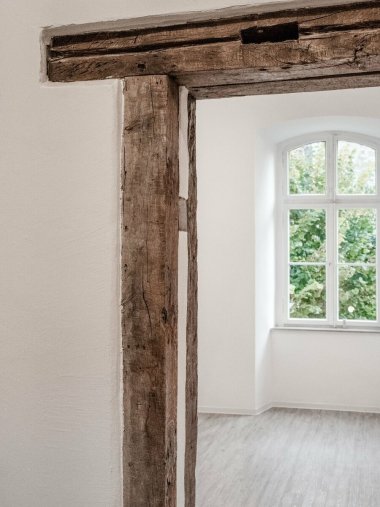 www.matthiasgoedde.de, © MATTHIAS GOEDDE
www.matthiasgoedde.de, © MATTHIAS GOEDDEOur exhibition rooms are always new with exhibitions that change several times a year. Works by regional and national artists are presented; paintings, sculptures, drawings and installations show the versatility of contemporary art.
The art breaks are open guided tours and provide an overview of the current exhibition.
Achim Zeman: Spatial illusion - illusionary spaces
21 February - 14:00 14 March - 14:00 21 March - 14:00 28 March - 14:00
If you would like to take part as a group, individual appointments can be arranged.
Contact: Silvia Brede, 02521/29 4243 or brede@beckum.de
By the way...
Concrete Delusion - the art project
Sculptures along the Beckum cement route
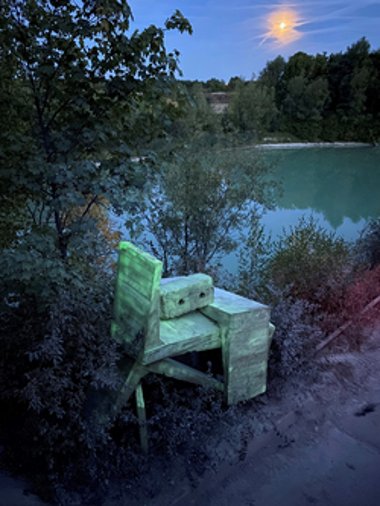 Photo: www.manuelschroeder.com
Photo: www.manuelschroeder.comThe project "Concrete Delusion - The Green Line" by the Berlin media artist Manuel Schroeder complements the cycle route around Beckum with the sculpture "Fragment-#1DE-BE-09/22" until September 2023. This was shown for the first time on the occasion of the national open monument day in Beckum on 8 September 2022, accompanied by a live performance by the Cologne actor Thomas Krutmann, who reinterpreted the story of the Beckum stone cooler.
The artist already presented the project in 2020 in an exhibition at the City Museum and with a sound and light installation in the quarry of Phoenix Zementwerke GmbH. In "Concrete Delusion", Manuel Schroeder dedicates his artistic research to the origins and possibilities of the material concrete, its architectural legacies in public space and their artistic transformation.
The project is supported by the Museumsverein Beckum e.V., Phoenix Zementwerke GmbH and InformationsZentrum Beton GmbH, among others.
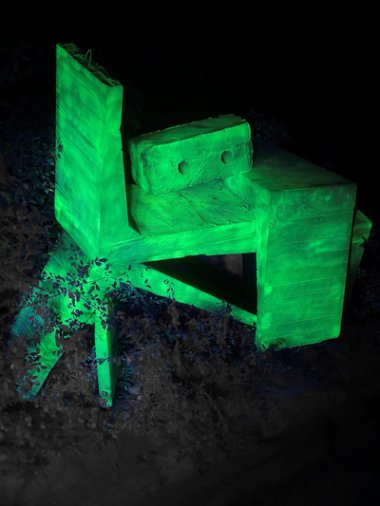 Photo: www.manuelschroeder.com
Photo: www.manuelschroeder.comMuseum education
Educational programme at the City Museum
Dates on request and more information on tel. 02521 29-4243 at the Stadtmuseum Beckum. Your contact person is Silvia Brede.
For little guests - "Fridolin the museum frog invites you ..."
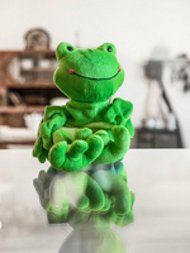
... to a museum educational programme for groups of young first-time visitors. The programme is aimed at prospective schoolchildren from interested day-care centres as well as younger children from special schools.
We go on an exciting journey of discovery through the city museum. We will learn why museums exist in the first place, how to behave in a museum, what happens when a thief tries to steal a picture and much more.
Guided tours and culture strollers

We offer guided tours for school classes and interested groups on the current exhibition of contemporary art and on topics related to the history of the city. Individual arrangements are possible.
Kulturstrolche

Creating encounters between children and culture - throughout their (primary school) lives - that is the aim of the Kulturstrolche project. Cultural institutions and artists open their doors and invite the Kulturstrolche to take a look behind the scenes. Beckum, along with a few other municipalities in NRW, offers this programme nationwide. This means that all pupils in Beckum from the second school year onwards are a Kulturstrolch. This gives pupils the opportunity to visit and explore various local cultural institutions as part of a class excursion until the end of their primary school career.
Culture rucksack - Discover your city!
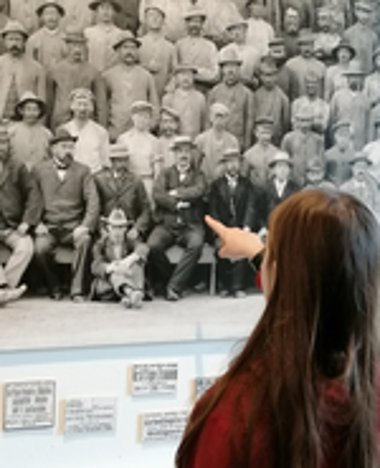
In around 200 cities in North Rhine-Westphalia, children and young people between the ages of 10 and 14 are given a cultural rucksack. The town of Beckum has joined the state-wide funding programme as a partner and has been developing new cultural activities for this age group ever since. The aim is to open the door to culture and art as widely as possible for children and young people.
Young people are given the opportunity to visit a cultural institution as a class within a school year and thus experience a cultural sector in action. In addition, a variety of HOLIDAY CULTURE PROJECTS, new CULTURE WORKSHOPS and new CULTURAL COURSE OFFERINGS are created with local cooperation partners.
The state programme "Kulturrucksack" promotes cultural activities for pupils aged 10 to 14.
 Photo: Clauser/Die Glocke
Photo: Clauser/Die GlockeHistory
From the Town Hall to the City Museum
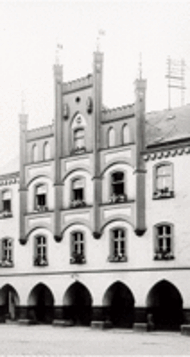 City Hall before 1937
City Hall before 1937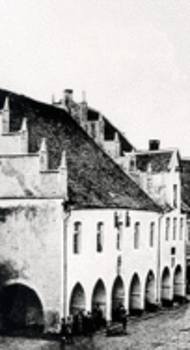 City Hall before 1879
City Hall before 1879The building has a medieval core that can be traced back to 1441. However, it was not until 1879 that it was rebuilt that it received its high gable, which dominates the market square.
Before the museum was founded, the building served as the seat of the town administration and in earlier times also as a district court, savings bank, fire station, town guard, police station and prison, as can still be seen from some of the barred window openings on the ground floor.
Place of jurisdiction
Its centuries-old function as a place of jurisdiction is evidenced not only by the show gable and the arched hall, but also by the two sandstone figures on the façade representing the local and church patrons St. Stephen and St. Sebastian (early 16th century, originals in the former council chamber on the first floor).
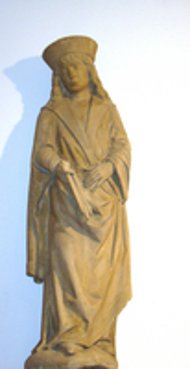 Saint Sebastian
Saint Sebastian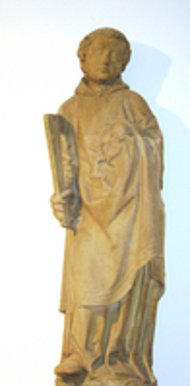 Saint Stephen
Saint StephenIn 1986, the town museum was established in the historic town hall.
Museum Society
Day trip to Derneburg Castle and Fischbeck Abbey on 24 May 2025


The Museum Association is once again offering you an interesting art excursion: The destinations are the newly established Derneburg Castle Art Museum (south-east of Hildesheim) and the art gem of Fischbeck Abbey on the Weser. The contact between the Middle Ages and modernity could not be greater, but both places combine art, history and the joy of discovery in a profitable way.
The museum association is organising the tour together with the Kreiskunstverein Beckum-Warendorf and the Kunstverein Ahlen.
Beckum: The book
To get everyone in the mood for the town's anniversary in 2024, the Beckum Museum Association presented an entertaining reference book in which (almost) everything important and characteristic about Beckum can be found. A book for insiders and newcomers.
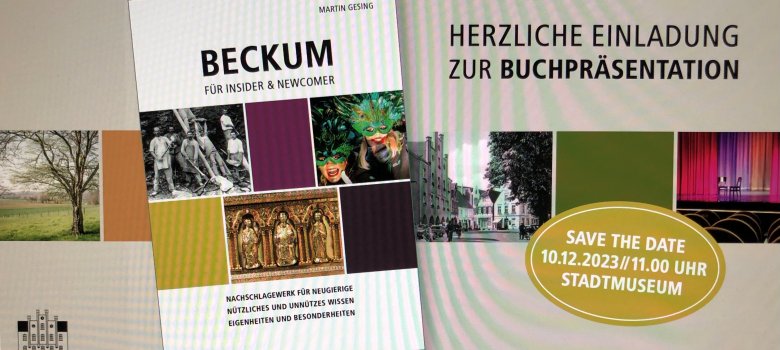
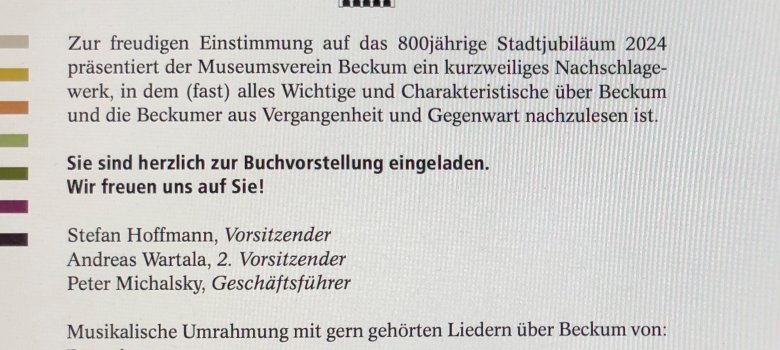
Ideational and financial support
The city of Beckum is the sponsor of the museum. It is supported by the Beckum Museum Association (Museumsverein Beckum e. V.), which provides moral and material support for the museum and introduces citizens to the work of the museum and deepens their interest in culture and history.
The association supports the special exhibitions and publications of the Stadtmuseum and enables the purchase and restoration of artefacts and objects for the museum's collections. It maintains a library to support scientific research in the museum. In addition to study trips, the museum association organises lectures on the historical development of our region.
